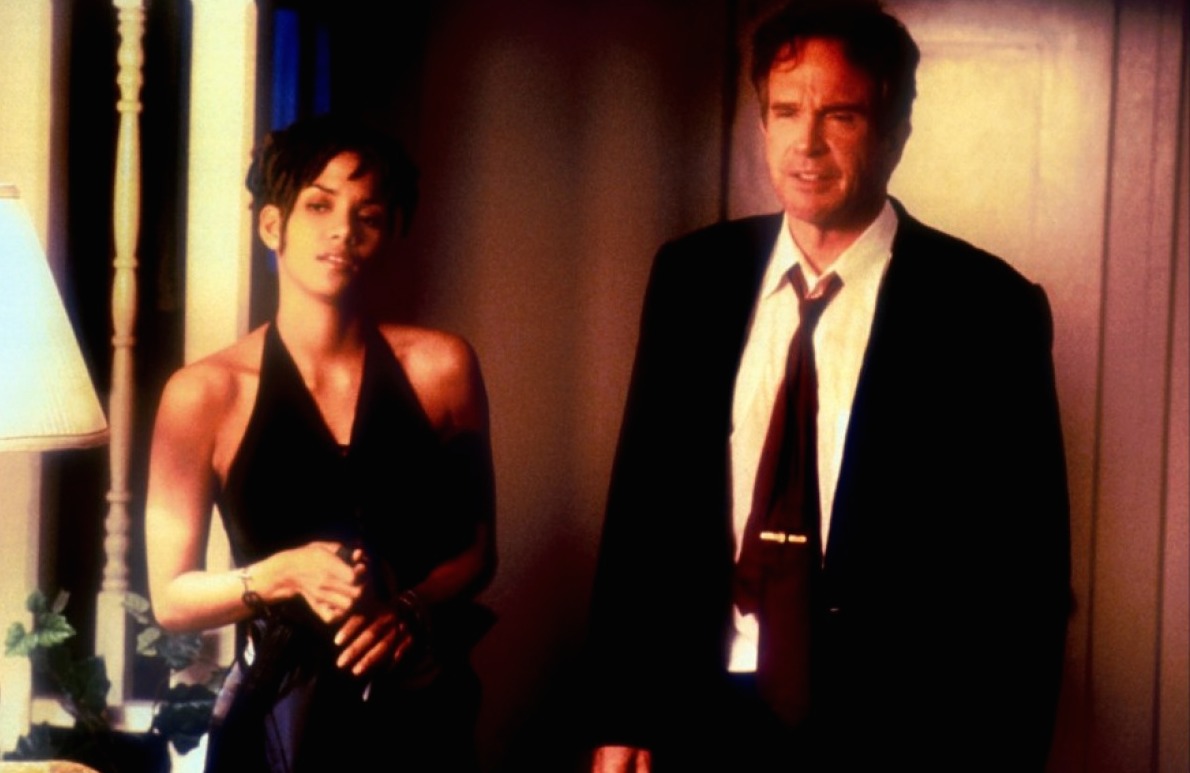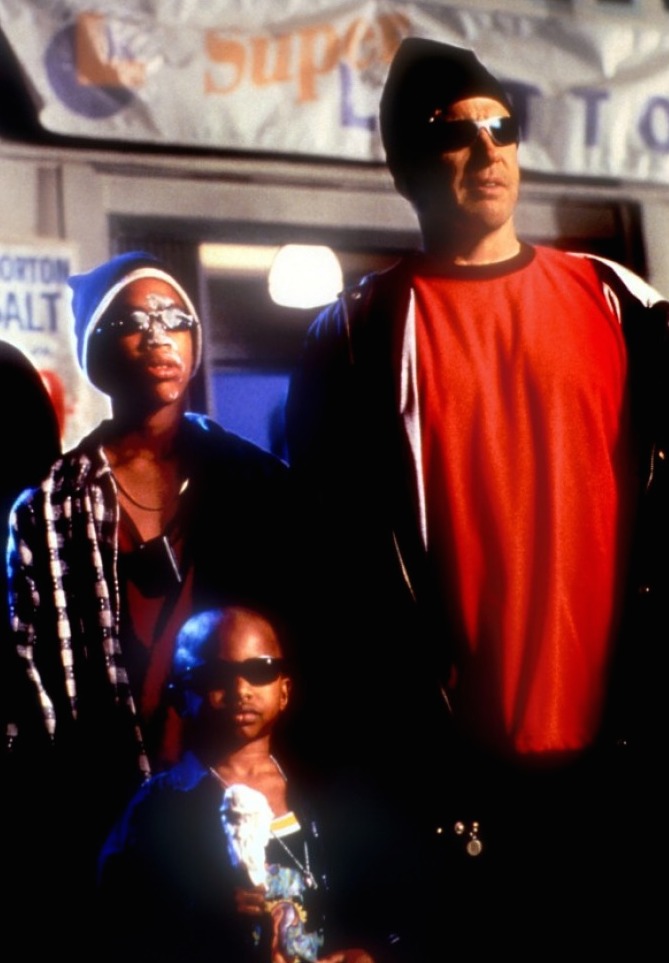Warren Beatty didn’t have to make Bulworth. He was there for the revolution more than three decades earlier, when Bonnie And Clyde signaled a new era of iconoclastic filmmaking, and he rode the wave through classics like McCabe & Mrs. Miller and The Parallax View, while tomcatting his way through Hollywood’s most beautiful women. Later, he found prestige behind the camera, too, by writing, directing, producing, and starring in Reds, his epic historical drama about the Russian Revolution. He did likewise (minus the script) with Dick Tracy, his peculiar but rapturously beautiful attempt to make a blockbuster with retro flair. Though he rode a plum role in Bugsy to further acclaim—and a marriage to co-star Annette Bening—Beatty worked far less frequently in the 1990s, and seemed inclined to fade slowly into Hollywood legend.
Then, the 61-year-old put on a black stocking cap and sunglasses, with a dark hooded sweatshirt and shorts that drooped below the knees, and began to drop science—political science. That particular look doesn’t come up until Bulworth’s third act, when Beatty is at the end of the limb he spent the movie climbing out on. As Jay Billington Bulworth, incumbent U.S. senator from California, he’s already white-boy-rapped his way through campaign events in front of shocked donors from Hollywood and corporate America, and offered thoughts on black people and Jews that virtually requires a fictional persona to duck behind. This wasn’t just any old star willing to make a fool of himself to serve a political point. This was Warren Beatty, a star so famous for his vanity that an entire movie (Shampoo) was spun out of it—and, rumor had it at the time, a hit single by one of his many exes, Carly Simon.
So what in the world was Beatty thinking? In the absence of any other evidence, he was mad as hell and not going to take this anymore. Produced in the middle of Bill Clinton’s second term, Bulworth is a howl of frustration from an old-school liberal who saw the chasm between the enlightened rhetoric of a twice-elected president, and his woefully compromised policies. It’s a satire about America’s sold-out political system generally, but it’s aimed specifically at Warren Beatty types, people who identify as Democrats, but resent the way the system reflects the values of big-money donors, regardless of party. There’s precedent for what he’s doing: The film recalls 1970s benchmarks like The Candidate and Network to equal degrees, and there’s a pinch of Preston Sturges’ The Great McGinty in there, too. But there’s a special kind of madness to Bulworth, which hobbles along the line between inspiration and foolishness like a failed sobriety test.

Establishing the action during the California primaries in the middle of Clinton’s second term, the opening titles end with these four perfect words: “The populace is unaroused.” A bloated embodiment of this apathy and disillusionment, the state’s incumbent U.S. senator boozes his way through the latest series of campaign commercials, which use the platitude “We stand at the doorstep of a new millennium” to cover the weakening of his positions on affirmative action, welfare, and immigration. Described by enemies as “an old liberal wine trying to pour itself into a new conservative bottle,” Bulworth has spent his untold years in office selling out whatever ideals he once had, and the film catches him in a state of suicidal self-loathing. Taking out a $10 million life-insurance policy from one of the corporate bigwigs (Paul Sorvino) who has him in his pocket, Bulworth puts a hit out on himself, assured that the money will go to his daughter upon his death.
With death’s sweet release imminent, Bulworth doesn’t have to go numbly through the motions on his campaign tour; he can say whatever he wants and literally not have to live with the consequences. And so he informs the parishioners at a black church that they didn’t get funding to rebuild after the riots because they didn’t contribute money to his campaign (“Whaddya gonna do, vote Republican?”), and that, “If you don’t put down the malt liquor and chicken wings, and get behind someone other than a running back who stabs his wife, you’re never gonna get rid of somebody like me.” (More on that second statement in a bit.) With a new entourage in tow, including the sexy but duplicitous Nina (Halle Berry), Bulworth starts connecting to the anti-authoritarian rhythms of hip-hop and working rhymes into speeches. (Sample: “We got a million brothers in prison / I mean, the walls are really rockin’ / But you can bet your ass they’d all be out / If they could pay for Johnnie Cochran.”)
Beatty’s script, which he wrote with Jeremy Pikser, has an abundance of useless elements: A C-SPAN crew (Wendell Pierce, Laurie Metcalf, Sean Astin) following Bulworth around and cueing viewers with their aghast reaction shots; a homeless sage played by Amiri Baraka (“You got to be the spirit, you can’t be no ghost”); and a murky plot that has Nina trying to bail out her brother by taking money for helping expedite Bulworth’s assassination. Bulworth’s romance with Nina, played by an actress nearly 30 years Beatty’s junior, is the one bit of vanity the actor-director allows himself, and it further weakens a satire that’s already driven to distraction. Though Beatty has a reputation as a perfectionist—backed by his famed cinematographer, Vittorio Storaro, who puts his color filters to expressive use here—Bulworth doesn’t have the relentless focus of great satire. It doesn’t punch; it flails.

The flailing gets the film into a productive kind of trouble when it comes to Bulworth’s (and Beatty’s) co-option of black culture. When Bulworth lectures a black church about putting down the malt liquor and chicken wings and supporting someone other than O.J. Simpson, it’s hard to parse it out from his line about politicians only serving big campaign donors. Are these both supposed to be truth bombs? And if the first line is to be taken as backward—as evidence that Bulworth has prejudices that are perhaps worked out over the course of the film—then Beatty does himself no favors by populating Nina’s world with gangstas, hydraulics, Cypress Hill songs, and other ’hood clichés. (In one minor victory against stereotypes, Bulworth praises the collard greens passed around by Nina’s family, only to be told that the vegetables he likes are, in fact, kale.) Given a character whose transformation lets him talk candidly about politics and race, Beatty ventures into dicey territory, and a monologue by Nina about the true reason for black disenfranchisement (the disappearance of its urban, blue-collar manufacturing base) doesn’t fully bail him out.
(Side note: As with The Candidate and Network, Bulworth’s candor causes his popularity to spike unexpectedly, leading him to try to call off the hit. But I’ve never bought into the fantasy that the public actually favors honest talk over platitudes. A real Straight Talk Express would drive right off a cliff.)
Better to flail, though, than not fight at all. What’s striking about Bulworth now is that an American studio movie could wade into such treacherous cultural waters without having to check the polling first. Fox released Bulworth in 1998, and earlier in the decade, Universal Pictures was turning out Spike Lee joints like Jungle Fever, which looks far more brazen now than it did more than 20 years ago, when Lee brought the third-rail issue of interracial relationships right out into the open. As a participant in our “cultural conversation”—a term that’s lately been tagged with sarcasm and dread—Bulworth isn’t the most polished articulator of the nation’s ills, but it’s willing to have a real conversation, open and perhaps pocked by the occasional misstatement. Better MC Beatty appropriating rap to make provocative, half-cracked political statements than MC Rove appropriating rap as a cynical, self-deprecating joke.
Seen today—as in right this minute—Bulworth falls right in step with the second-term blues felt by many of President Obama’s supporters, who have watched his idealism sink deep into the bog of Beltway politics over the past six years. And though the president’s race gives an ironic twist to Bulworth and Nina’s conversation about the absence of black leadership, the core feeling of disillusionment at the film’s heart hasn’t changed a bit. (If anything, the film’s alarm about a Washington that caters entirely to corporations now seems quaint.) What’s special to Bulworth—and the truest sign that the film isn’t a departure at all—is the idea of solving the nation’s problems through “procreative racial deconstruction,” i.e. “Everybody just gotta keep fuckin’ everybody ’til they’re all the same color.” Now that’s doing things the Warren Beatty way.

